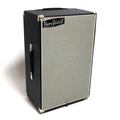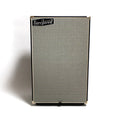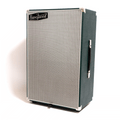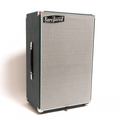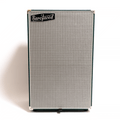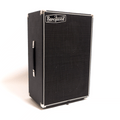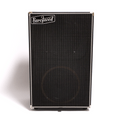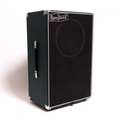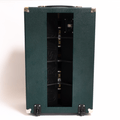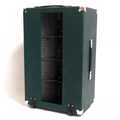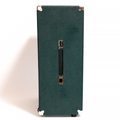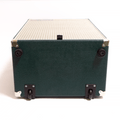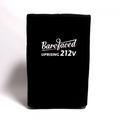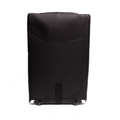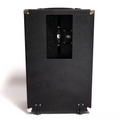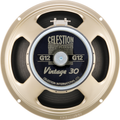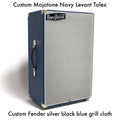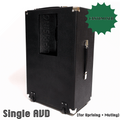Uprising 212V
Regular price
£599.00
£999.00
This isn’t just a revolution, it’s an Uprising! A tower of power, featuring dual Celestion 12” drivers with the latest version of our unique Barefaced AVD enclosure for massively improved dispersion and output.
The standard Vintage 30 speakers produce oodles of classic guitar tone and handle 120W RMS of power for all but the loudest gigs yet the complete cab weighs only 38lbs (17kg) - and has tilt and roll wheels and three handles for the easiest load-in you’ve ever had with a proper rock rig.
If you want a different tonal flavour we offer the full complement of Celestion twelves to customise your cab, including neo Creambacks to drop the weight to under 26lbs (12kg) or ultra high output Copperbacks for that raw EV tone with 500W of power handling for big amps. Other impedances are also possible as custom orders, to suit your favourite amp.
At Barefaced we know that the PA world’s obsession with polar patterns has hugely improved live sound over recent decades - and that’s why the Uprising 212V and Radical 212H are completely unique designs. Both the AVD implementation and internal electronics maximise the audio performance to suit their driver orientations, details never before seen in the guitar world. You won’t hear this benefit in an ideal room with a perfect mix but in the real world of difficult venue acoustics or bandmates treading on each other’s metaphorical sonic toes, this matters more than you can imagine! So whether you want a full width 212 to look great under your Marshall head or a vertical 212 for the smaller stage footprint and mini-amp aesthetics, we have a Barefaced diffractor guitar cab for you.
If you haven’t heard a Barefaced Diffractor guitar cab you may be sceptical that something this small and light can sound as big and heavy as a 412 - or that it’ll cut through on stage without being as large. This is where the science comes in:
The AVD enclosure uses both sides of the cone to generate sonic output, doubling its acoustic power and dispersing that sound everywhere around the room. No longer will you have to lurk in that narrow cone of tone and finally you’ll be able to consistently get that Goldilocks mix, not too loud, not too quiet, just right - both on stage and in the audience. Gigs are better when you all hear the music as it’s meant to be!
Specifications
| Stock - V30 | Custom - Minimum | Custom - Maximum | |
| Dimensions (H x W x D) |
74cm x 48cm x 31cm 29" x 19" x 12" |
||
| Weight | 17kg / 38lbs | 12kg / 26lbs (Neo Creamback) | |
| Drivers | Celestion Vintage 30 | 20+ custom Celestion 12" choices | (including mixed pairs) |
| Enclosure design | AVD | ||
| Power handling | 120W RMS | 40W RMS (G12M EVH) | 500W RMS (Neo 250 Copperback) |
| Nominal Impedance | 16 Ohms | 4 ohm | (8 ohm also available) |
Features
- Innovative internal design - Barefaced AVD enclosure for superior audibility, efficiency and power handling
- Low-cut filter toggle switch
- Choose from the entire range of Celestion 12" speakers. The iconic Celestion Vintage 30 fitted as standard.*
- Either a black or silver cloth grill with white piping.
- British Raging Green or Black in Black tolex.
- Top strap handle to tilt and roll, dual side strap handles to carry.
- Large rubber feet and tilt and roll wheels on base.
- Dual combi 1/4” + speakon sockets
*Additional customisation fee applies. See below.
Questions
Traditional guitar loudspeaker designs.
There are basically two sorts - closed-back and open-backed. Open-backed because they were combos and needed to keep the valves cool and accessible for servicing, closed-back and sealed because that’s how most speakers were made in the 1960s.
How does that affect using them?
The closed-back cabs have narrowing dispersion as frequency increases (a hi-fi speaker uses smaller speakers for higher frequencies to reduce this problem). The open-backed cabs fire sound out of the back as well as the front, so although the dispersion narrows from both front and back in much the same way as the closed-back cab, the sound coming out of the back helps fill the room with mids and highs - but that sound out of the back cancels out most of the lows (due to the inverted phase as the back of the speaker pulls when the front pushes and vice versa). In other words, open-back cabs are easier to hear around the room but the lows are thinner.
How is the Uprising 212V different?
From the front it behaves much like a closed or open-backed cab. But the mids and highs coming out of the AVD+ at the back are amplified and dispersed around the room whilst the lows are inverted to match the lows from the front, giving lots more bottom. Basically you get twice the output of a closed back cab with an identical speaker AND even better dispersion and audibility (and far far greater output) than an open-backed cab.
What is AVD?
You see it when you look at the back of the cab - it’s the Augmented Vent Diffractor. It’s a unique patented technology that we started developing back in 2013. At low frequencies it acts as a tuned vent or Helmholtz resonator, improving efficiency, power handling and output. At mid and high frequencies it acts to diffract, disperse and couple the sound with the room for improved audibility and output especially in rooms with poor acoustics.
What is the Lo Cut filter for?
The increased low frequency output from the AVD may be too much for some guitarists’ tastes - so you can flick this switch and remove lows at the cab. Doing so not only changes the bass response but also increases the power handling of the cab, lowers the distortion due to motor excursion and reduces the load on your amp’s output stage. This can give you two different sweet-spots of optimum speaker overdrive or break-up and two different sweet-spots of power valve overdrive. If your sound is perfect in rehearsal but too dirty at a louder gig then engaging the Lo Cut filer will clean it up.



















